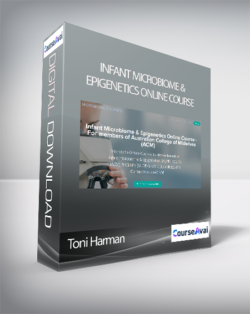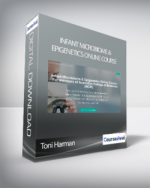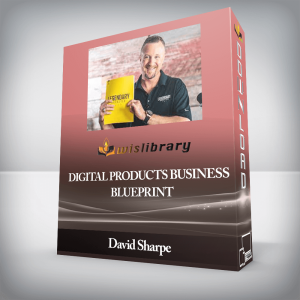Microbirth Online Course. Evidence-based on infant microbiome & epigenetics. 9 CPD HOURS (ACM), 9 CERPs (IBLCE) & 0.9 CEUs (MEAC) & 9 Contact Hours (ACNM) Purchase Toni Harman – Infant Microbiome & Epigenetics Online Course – For members of Australian College of Midwives (ACM) courses at here with PRICE $105 $35Toni Harman – Infant Microbiome & Epigenetics Online Course – For members of Australian College of Midwives (ACM)Infant Microbiome & Epigenetics Online Course – For members of Australian College of Midwives (ACM) Microbirth Online Course. Evidence-based on infant microbiome & epigenetics. 9 CPD HOURS (ACM), 9 CERPs (IBLCE) & 0.9 CEUs (MEAC) & 9 Contact Hours (ACNM) THIS COURSE IS FOR MEMBERS OF:AUSTRALIAN COLLEGE OF MIDWIVESTHE INFANT MICROBIOME & EPIGENETICS(MICROBIRTH ONLINE COURSE 9 x 60 MINS)For Australian College of MidwivesHelping YOU feel more confident about the infant microbiome.Helping YOU support parents with full informed choice.Helping YOU understand the science that strongly supports:– vaginal birth– immediate skin-to-skin contact– exclusive breastfeedingFor the optimal development of the infant immune system for best possible lifelong healthEvidence-based with up-to-date referencesEasy-to-understand & easy-to-digestGo-at-your-own pace online learning so you can take days, months or up to 3 years to complete!Learn from 11 leading professors and 2 lactation expertsApproved for 9 CPD HOURS / CE credits & 9 CERPS (4L & 5R) # 320017K Downloadable handouts & Certificate of CompletionCovers the developing infant microbiome and epigenetics during conception, pregnancy, vaginal birth, C-section, breastfeeding & formula feeding Course FeaturesThe course content is divided into 9 sesions of 60 mins.Each session is split into bite-sized 5-10 minute lessons featuring:PDF presentationshigh-quality short videos featuring 11 world-leading professorsonline graded testsdownloadable study handouts including scientific referencesstudent evaluationsmoderated discussion forumsLifetime access means you can go at your own pace, and return to the course content again and again. The course content will be regularly updated ensuring you are kept up-to-date with the very latest research! On completion of the whole course, a print-ready Certificate of Completion is available to download for continuing education credits.Course ContentsThe 9 x 60 mins sessions are:Introduction to the microbiomeMicrobiome and pregnancyMicrobiome and vaginal birthMicrobiome and C-sectionMicrobiome and breastfeedingEpigenetics and pregnancyEpigenetics and vaginal birthEpigenetics and breastfeedingScience of oxytocin Key Benefits* Learn the science from 11 world-leading professors & 2 lactation experts* You will feel much more confident when asked questions by parents.* You will be up to date with the latest evidence-based research.* You will understand the role of the infant microbiome and epigenetics during pregnancy, birth, breastfeeding and early infancy. * You will be in a better position to empower parents with full informed choice.Approved for 9 Continuing Education credits:If you are a midwife (LM, CPM, CM, CNM), lactation consultant, nurse, doula, childbirth educator, breastfeeding professional or other health professional, the following CE credits are accepted by many midwifery, nursing, doula, childbirth education orgnanizations including: IBLCE, AMCB for CMP, ACM, CCI, ICEA, DONA International, CAPPA and as CE Credits by Lamaze Certified Childbirth Educators. 9 CPD HOURS – Australian College of Midwives (ACM)9 CONTACT HOURS – American College of Nurse-Midwives (ACNM) #2019/0129 HOURS / 0.9 CEUs – Midwifery Educational Accreditation Council (MEAC) Program No #M1819-62-0621DE9 CERPs (4 L-CERPs & 5 R-CERPs) – International Board of Lactation Consultant Examiners (IBLCE) CERPS Registry No. 320017K9.0 LAMAZE CONTACT HOURS – Lamaze International LIN 18-20. These hours may be applied towards recertification as an LCCE educator under the learning competencies 1, 3, 5 and 6. 9.0 CONTACT HOURS – accepted by International Childbirth Education Association (ICEA) LIN 18-20 9 HOURS of continuing education approved by the Midwifery Council (for midwives of New Zealand). This course has been approved as continuing midwifery education by the Midwifery Council (New Zealand) for 9 hours. Alto Films Ltd Approval Number: 2018CME038E This course can be used as 9 HOURS CPD for revalidation by the Nursing and Midwifery Council (NMC)The 9 CONTACT HOURS approved by Lamaze International are accepted as 9 Contact Hours by CAPPA, DONA International and other doula / childbirth education organisations (please check with your own organisation). American College of Nurse-Midwives (ACNM) is an approved provider of nursing CNEs. This means 9 Contact Hours approved by ACNM can be used as 9 nursing CNEs, but please check with your state board / provider. Approved for 9 HOURS / 0.9 Midwifery CEU credits by the Midwifery Education & Accreditation Council ( Program No #M1819-62-0621DE). These 9 HOURS / 0.9 Midwifery CEUs are applicable for Certified Professional Midwives recertifying through the North American Registry of Midwives (NARM). Accepted as 5 HOURS for CLC recertification purposes by the Academy of Lactation Policy and Practice (ALPP).How do Continuing Education credits apply to you?– This course is an Australian College of Midwives CPD Recognised Activity and has been approved for 9 CPD Hours.– Australian Midwives and Nurses are required to collect 20 hours of Continuing Professional Development (CPD) each year, so this course will provide 9 CPD Hours out of those 20 CPD Hours. If required for auditing, the course certificate will provide date and number of CPD Hours. If required for auditing, a brief description of objectives are listed at the start of each course session.– 9 Contact Hours (ACNM) are applicable to Nurse-Midwives, Certified Midwives, Registered Nurses, doulas and childbirth education providers.– ACNM is an approved provider of nursing CNEs, so 9 Contact Hours approved by ACNM are accepted as Contact Hours by many state boards for nursing CNEs (please check with your own state board/provider)– 9 Contact Hours (ACNM) are accepted by the Competency and Credentialing Institute (CCI) for CNOR recertification and CRNFA recertification.– 9 Contact Hours (ACNM) are accepted as part of Certificate Maintenance Program (CMP) by the American Midwifery Certification Board (AMCB). The AMCB operates on a 5-year certification cycle. That means that if you initially pass in 2017, you will have five years until 2022 to fulfil the certification cycle requirements, which includes completion of 20 Contact Hours (2.0 CEUs)– 9 HOURS / 0.9 Midwifery CEU’s (MEAC) can be applied to Certified Professional Midwives registered with the North American Registry of Midwives (NARM) and can also be used for recertification and general career development by midwives and other healthcare providers.– 9 CERPs (4 L-CERPs and 5 R-CERPs) can be used for recertification for Lactation Consultants (IBCLC). Five years after most recently passing the IBLCE certification exam, IBCLCs may renew their certification by demonstrating completion of 75 hours of continuing education that has been approved for CERPs. Of these, at least 50 must be L-CERPs. IBCLCs recertifying by CERPs may use up to 20 R-CERPs to complete recertification requirements.– Accepted as 5 HOURS for CLC recertification purposes by the Academy of Lactation Policy and Practice (ALPP).On completion of the Infant Microbiome & Epigenetics (Microbirth Online Cours ), you will receive your own Certificate of Completion listing the above Continuing Education credits.Testimonials Overall Opinion Of Microbirth Online Course“Absolutely fascinating subject. Thank you so much for putting this together”“A brilliant resource for midwives” “I found it really interesting. It was easy to understand and the videos were really engaging”“Very insightful information that is critical to pass on to both healthcare professionals as well as to pregnant moms and dads”“As a midwife and IBCLC, I found the info on the microbiome and the Lactobacilli in the bowel and vagina fascinating. I aim to share it with colleagues and with women and families for whom I provide care and reinforce the issues around skin to skin and breastfeeding esp. breastfeeding being more than a food” “I just wish we could ensure that all medical students and nursing students had access to this as part of their early training”“It was very educational, and informative. It certainly will help me strive towards even better care”“Very happy with the value for the price and excited about the information. Scientifically ground breaking, but not difficult to understand and teach” Opinion About Course Content“Providing theory to really back up the change in practice to empower midwives to educate women and their partners in maximising opportunities to colonise their baby’s microbiome” “The emerging research explains things we have known for a long time. It will help me communicate information about the importance of vaginal birth, breastfeeding and skin to skin both to women and their significant others and to other professionals”“Educationally, I appreciate how the content is repeated in the video and PDF to integrate many learning styles into the program”“I like how the line up evolved from beginning to end. It really made sense to me”“The videos and the slideshows were all extremely informative and linked together well”“It was very logical and easy to follow. It was an interesting perspective of the importance of birth and breastfeeding in creating our individual microbiome, equipping our immune system and preparing us to survive and thrive in the environment we are born into. The sobering consequences of not respecting this process are also presented” 11 WORLD LEADING PROFESSORSMARTIN BLASERMuriel G. and George W. Singer Professor of Translational Medicine, Director Human Microbiome Program, New York University Langone Medical Center and author Missing Microbes MARIA GLORIA DOMINGUEZ-BELLOHenry Rutgers Professor of Microbiome and Health, Department of Biochemistry and Microbiology, and of Anthropology, Rutgers, The State University of New JerseyRODNEY DIETERTEmeritus Professor of Immunotoxicology, Cornell University and author The Human SuperorganismSUE CARTERProfessor & Executive Director, Kinsey InstituteANITA KOZYRSKJProfessor, Dept. of Pediatrics, University of AlbertaPHILIP STEEREmeritus Professor of Obstetrics, Imperial College LondonALEECA BELLAssociate Professor, University of Illinois at ChicagoLESLEY PAGEVisiting Professor of Midwifery, Kings College LondonHANNAH DAHLENProfessor of Midwifery, Western Sydney UniversityJACQUELYN TAYLORVernice D Ferguson Professor in Heath Equity, New York UniversityGREGOR REIDProfessor of Microbiology, Immunology & Surgery, University of Western OntarioPLUS 2 LACTATION EXPERTSLAUREL WILSON, IBCLCInternational breastfeeding speakerCo-author of bestselling books: The Greatest Pregnancy Ever and The Attachment PregnancyMAUREEN MINCHINAuthor of Milk Matters: Infant Feeding and Immune DisordersGroup Discounts & Institutional UseDiscounts for groups?Yes, of course! The more the merrier.Everyone in the group will receive their own login and password to the course.Everyone in the group can complete the course at their own pace and will have lifetime access.Everyone in the group will be able to download all the handouts, the Certificate of Completion and receive the Continuing Education credits.For a personalised group discount quote, please get in touch with the course creators via the Contact Us link below.Institutional use?If you would like the course materials for institutional use (larg organisations, schools, colleges, universities), please use the Contact Us link below for a personalised quote.Contact UsIf you have any questions, comments or suggestions, please get in touch using this link – messages drop straight into our inbox. We’ll do our best to respond within 48 hours.Your Instructor Toni HarmanToni Harman is the co-producer/director of the of the multi award-winning documentary MICROBIRTH and co-author of the books, THE MICROBIOME EFFECT (UK & World) & YOUR BABY’S MICROBIOME (US/Canada). Toni is the founder and course leader of MICROBIRTH SCHOOL (MICROBIOME COURSES).Toni has been featured on BBC Radio 4 Woman’s Hour, BBC Radio 5 Live, BBC World Service and appeared as a guest on numerous podcasts. Her work has been featured in The Observer, The Daily Telegraph and the Daily Mail. Toni has written blog-post articles for Scientific American and the Huffington Post. Toni has also been keynote speaker at several international scientific, midwifery and breastfeeding conferences.You can contact Toni Harman via the contact form HERE.Course CurriculumInfant Microbiome & Epigenetics Online Course – For members of Australian College of Midwives (ACM)START HERECourse instructionsSummary of ContentsList of professors and lactation expertsSpeaker Disclosure & Conflict of Interest Declaration FormsNotes on copyright, gender and spellingLegal Disclaimer 1Legal Disclaimer 2Session 1. Introduction to the microbiome1. Session One – Objectives2. VIDEO: Introduction to the science of childbirth (2:53)3. Explanation of the human microbiome4. VIDEO: What is the microbiome? (5:42)5. Microbiome and human health6. VIDEO: Connection between the microbiome and human health (5:51)7. How humans are impacting the microbiome8. VIDEO: Concerns for the future (4:34)9. To safeguard human health10. VIDEO: Potential importance of microbes during conception (1:56)11. Session One – Downloads12. Session One – TestSession 2. Microbiome and pregnancy1. Session Two – objectives2. VIDEO: The microbiome and pregnancy (2:03)3. Maternal heritage and Group B Strep (GBS)4. VIDEO: How a mother’s microbiome changes during pregnancy (2:31)5. How a mother’s microbiome changes during pregnancy6. VIDEO: Focus on potential prenatal exposures during pregnancy (6:05)7. Fetus exposed to microbes during pregnancy8. Session Two – Downloads9. Session Two – TestSession 3. Microbiome and vaginal birth1. Session Three – Objectives2. VIDEO: The microbiome and vaginal birth (4:01)3. Main seeding event for vaginal birth4. VIDEO: The microbiome and the developing immune system (5:18)5. Microbiome and development of the infant immune system6. VIDEO: The progression of microbes in pregnancy, birth & infancy (3:38)7. One chance for immune training8. Session Three – Downloads9. Session Three – TestSession 4. Microbiome and C-section1. Session Four – objectives2. VIDEO: The microbiome and C-section (7:26)3. Potential impact of C-section on infant microbiome4. VIDEO: C-section and longer term health problems (3:19)5. C-section and increased risk of non-communicable disease6. VIDEO: Association or causation? (3:04)7. Possible solutions for babies born by C-section?8. VIDEO: C-section and ‘swab-seeding’ (7:12)9. Session Four – Downloads10. Session Four – TestSession 5. Microbiome and breastfeeding1. Session Five – objectives2. VIDEO: Benefits of skin-to-skin (5:21)3. Breast milk as perfect first food4. VIDEO: The microbiome and breast milk (4:41)5. Human milk oligosaccharides and other components6. VIDEO: Breast milk and the development of infant immune system (4:15)7. The impact of formula feeding8. VIDEO: The impact of formula feeding on infant health (2:22)9. Session Five – Downloads10. Session Five – TestSession 6. Epigenetics and pregnancy1. Session Six – objectives2. VIDEO: The difference between epigenetics and genetics (3:38)3. Explanation of epigenetics4. VIDEO: Focus on epigenetics and pregnancy (6:42)5. Epigenetic impact during pregnancy6. VIDEO: Stress in pregnancy (4:13)7. Session Six – Downloads8. Session Six – TestSession 7. Epigenetics and childbirth1. Session Seven – objectives2. VIDEO: Epigenetic Impact In Childbirth Hypothesis (EPIIC Hypothesis) (5:16)3. Explanation of EPIIC Hypothesis4. VIDEO: Views on EPIIC Hypothesis – Jacquelyn Taylor (3:16)5. Evidence for epigenetic changes during childbirth6. VIDEO: Views on EPIIC Hypothesis – Hannah Dahlen (3:04)7. Urgent need for more research8. Session Seven – Downloads9. Session Seven – TestSession 8. Epigenetics and breastfeeding1. Session Eight – objectives2. VIDEO: Breast milk as baby’s first food (2:33)3. Breastfeeding prevents disease4. VIDEO: Epigenetics and breast milk (2:27)5. Research into epigenetics and breastfeeding6. VIDEO: Breastfeeding provides more than breast milk (3:34)7. Formula feeding and epigenetics8. VIDEO: Guilt and infant feeding (1:26)9. Session Eight – Downloads10. Session Eight – TestSession 9. Science of oxytocin1. Session Nine – objectives2. VIDEO: What is oxytocin? (5:44)3. Explanation of oxytocin4. VIDEO: Optimal conditions for release of oxytocin (1:45)5. Role of oxytocin in childbirth6. VIDEO: The history of synthetic oxytocin (4:33)7. Use of synthetic oxytocin8. VIDEO: Common use of synthetic oxytocin (2:46)9. Synthetic oxtocin and risks for long-term health10. VIDEO: Explanation of research into synthetic oxytocin (4:33)11. Session Nine – Downloads12. Session Nine – TestEvaluation Form, Certificate of Completion & Course DownloadsStudent Evaluation FormScientific References – All sessions – DownloadExtra reading and viewing listCourse handouts – All sessions – DownloadCertificate of CompletionWANT MORE?Connect with us!Check out our other coursesFinal thoughtsSales PageArchive PagePurchase Toni Harman – Infant Microbiome & Epigenetics Online Course – For members of Australian College of Midwives (ACM) courses at here with PRICE $105 $35
 Evidence Based Technical Analysis – David Aronson
₹5,644.00
Evidence Based Technical Analysis – David Aronson
₹5,644.00
 Deep Tissue Massage and Myofascial Release – Art Riggs
₹6,972.00
Deep Tissue Massage and Myofascial Release – Art Riggs
₹6,972.00
Toni Harman – Infant Microbiome & Epigenetics Online Course – For members of Australian College of Midwives (ACM)
₹5,810.00




